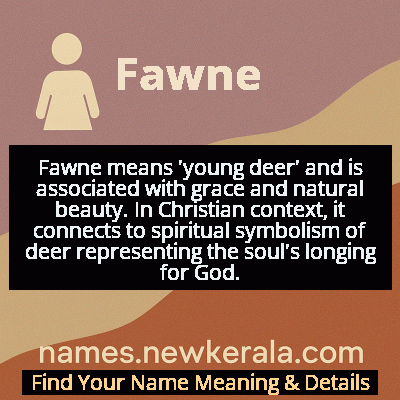Fawne Name Meaning & Details
Origin, Popularity, Numerology Analysis & Name Meaning of Fawne
Discover the origin, meaning, and cultural significance of the name FAWNE. Delve into its historical roots and explore the lasting impact it has had on communities and traditions.
Name
Fawne
Gender
Female
Origin
Christian
Lucky Number
4
Meaning of the Name - Fawne
Fawne means 'young deer' and is associated with grace and natural beauty. In Christian context, it connects to spiritual symbolism of deer representing the soul's longing for God.
Fawne - Complete Numerology Analysis
Your Numerology Number
Based on Pythagorean Numerology System
Ruling Planet
Uranus (Rahu)
Positive Nature
Strong sense of order, loyal, practical, and disciplined.
Negative Traits
Stubborn, overly serious, rigid, and prone to feeling restricted.
Lucky Colours
Blue, gray.
Lucky Days
Saturday.
Lucky Stones
Blue sapphire.
Harmony Numbers
1, 7, 8.
Best Suited Professions
Managers, engineers, accountants, organizers.
What People Like About You
Dependability, discipline, practicality.
Famous People Named Fawne
Fawne Love
Actress
American adult film actress known for her work in the entertainment industry
Fawne DeVoree
Model
American glamour model and internet personality
Fawne Stratford
Writer
Emerging author known for nature-inspired poetry and short stories
Name Variations & International Equivalents
Click on blue names to explore their detailed meanings. Gray names with will be available soon.
Cultural & Historical Significance
In Christian contexts, the name's meaning of 'young deer' takes on additional symbolism through biblical references to deer as creatures representing grace, gentleness, and spiritual longing. The Psalmist's reference to 'as the deer pants for streams of water' (Psalm 42:1) has made deer imagery popular in Christian art and literature, symbolizing the soul's thirst for God. This dual heritage—mythological and Christian—makes Fawne a name that bridges ancient nature worship with spiritual devotion.
Extended Personality Analysis
Individuals named Fawne are often perceived as gentle, graceful, and deeply connected to nature, much like the young deer the name represents. They typically exhibit a quiet strength, sensitivity to their environment, and an intuitive understanding of others' emotions. Their natural grace often makes them appear elegant and composed, even in challenging situations. There's an inherent gentleness to their character that draws people to them, creating natural bonds of trust and affection.
Beyond their gentle exterior, Fawne's often possess a strong spiritual or philosophical dimension to their personality. They tend to be reflective individuals who value authenticity and purity in relationships. Their connection to nature often manifests in environmental consciousness, artistic expression, or healing professions. While they may appear reserved initially, they reveal depth and wisdom to those who earn their trust, embodying the name's mythological associations with both natural wisdom and virtuous character.
Modern Usage & Popularity
In contemporary times, Fawne remains a relatively uncommon but cherished name, often chosen by parents seeking a nature-inspired name with classical roots. Its usage has seen modest increases in recent years as part of the broader trend toward unique, meaningful names. The name appeals particularly to families with interests in environmentalism, mythology, or spiritual traditions. While not ranking in the top 1000 names in most English-speaking countries, it maintains a steady presence as a distinctive choice that balances uniqueness with familiarity through its similarity to the more common 'Fawn.'
Symbolic & Spiritual Meanings
Symbolically, Fawne represents innocence, gentleness, and natural grace—qualities embodied by young deer in folklore and literature. The name carries connotations of purity and chastity from its mythological origins, while also symbolizing spiritual longing and connection to the divine through Christian deer symbolism. As a nature name, it evokes images of forest tranquility, seasonal cycles, and the delicate balance of ecosystems. Metaphorically, Fawne suggests someone who moves through life with quiet dignity, maintains strong ethical principles, and possesses an innate understanding of natural rhythms and human emotions.

